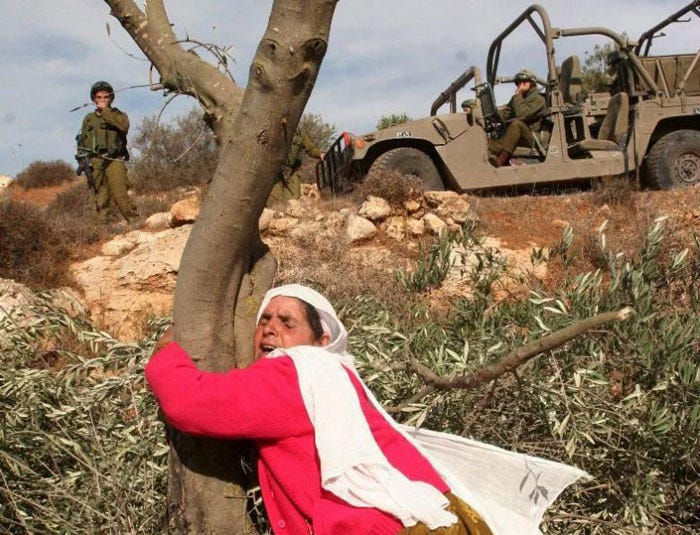Palestine, Zionism and the Olive Tree
Zionist Violence and the Theft of the Olive Tree
“If the Olive Trees knew the hands that planted them, their oil would become tears”– Mahmoud Darwish
Once upon a time. Imagine a land inhabited by its natives. The sun glinting down through sprawling olive branches, their vista as they gazed into the distance - perhaps whilst harvesting their crops - the rolling hills of Palestine, beneath clear blue skies. They toiled on their land from dawn to dusk, with a toil borne of the purest form of love, the inextricable and reciprocal bond between native and soil.
Just as they nurtured their land, the land responded to their touch in the kind of harmony that defies and transcends words. A simple people, largely rural agricultural, in a land of olive, fig and orange trees, villages on hilltops and houses built of stone, neighbouring communities living harmoniously. A peaceful and pure people of faith, little did they know that their fates and those of generations to come, were being sealed in places far away; oblivious to the nefarious deals being made in the corridors of power, in places that should have had no connection to them.
The earth must have trembled slightly on its axis, the moon hid her face, and the stars wept silvery tears as they looked down on this beautiful land and these pure people. Snaking treacherously across the dark waters, a swarm of boats laden with people secretly bound for Mandate Palestine. Making their way from Europe with friendly promises of co-existence, relying on the natural hospitality of the Palestinian Arabs but with strategic plans that stretched far into the future, constructed upon a projected myth: the colonisers that would “make the desert bloom”.
“A land without a people for a people without a land” as the famous lie goes. But there were a people; and they were already cultivating their own land, making the desert bloom in ways only they could; after all, they understood this land, it sprang to life beneath their fingers, was a part of the iconography of their hearts. But time would stand still for no one; and no one could have been prepared for the sheer destruction visited on them.
They arrived, the Zionists, boatloads of them hijacking Palestinian land, resources, culture and history. Burning and destroying villages, ethnically cleansing the native population. Whole family trees were obliterated, land was razed and maps re-inscribed as the Zionists built up their networks to colonise key agricultural sites so that they could concentrate efforts on stealing the valuable harvests.
Since ancient times, the Palestinians had tended the olive trees, distilling their “green-gold” into precious oil. Olives, figs dates and oranges were the Palestinians staple harvests, but the olive trees were integral to the Palestinian identity. Olive trees that are resilient, that grow in the harshest climates, their roots extending deep into the earth and anchoring them generation after generation, just like the Palestinians were anchored to their land, belonging to it as surely as it belonged to them.
In 1948, over 750,000 Palestinians were exiled into neighbouring countries, and those that remained have faced the gravest injustices from the genocidal military state of Israel. Elderly men who have harvested olives for generations, mercilessly harassed and beaten in their own olive groves. The trees have witnessed the brutality of the owners being cruelly attacked time and time again.
The Zionists have traditionally controlled water resources (see my article for Palestine Peace Collective on: Israel's Water Apartheid) so that the olive groves cannot be irrigated, they have systematically denied Palestinian olive farmers access to their own land, and they have erected apartheid walls to dispossess Palestinian farmers of land that their families have owned for generations. The Zionists talked about the desert blooming under their somehow “magical” touch, but in reality they usurped the land and stole the water, wasting it prodigiously and yet denying the Palestinians access to it.
From a 1994 New York Times article: “The Palestinians planted tiny olive trees; the Israeli soldiers dug them up. The Palestinians lay down in the road to block a bulldozer; the Israelis carted them off to police vans.”
Over the years, the olive trees have been poisoned, burned, damaged in other ways, chopped down, in the same way that Palestinians have been brutalised and ethnically cleansed since 1948 and even before this. Since 1967 more than 800,000 olive trees have been uprooted by the Israeli authorities in illegal campaigns, often being destroyed in front of their owners, to provide land for illegal settlers. This violence towards olive trees symbolises the systematic attempts at erasure of the Palestinian national identity through multiple means, by the Zionist regime.
According to the apocryphal story, King Solomon, in order to determine the veracity of two women’s maternal claims to a child, suggested that they share the child - by cutting it in half. The real mother relinquished her claim in order that she would not have to bear the pain of seeing her child cut in half - and thereby the identity of the real mother was determined.
Olive trees symbolise resilience, endurance, harmony with the land, resistance. This is why they are such a potent symbol of the Palestinian identity. In its hatred fuelled and acquisitive campaign to destroy the olive trees, the Israeli’s physically demonstrate to the world what it knows deep down: a true native of the land could never unleash destruction upon it, just as a true mother could never cut her child in half.


